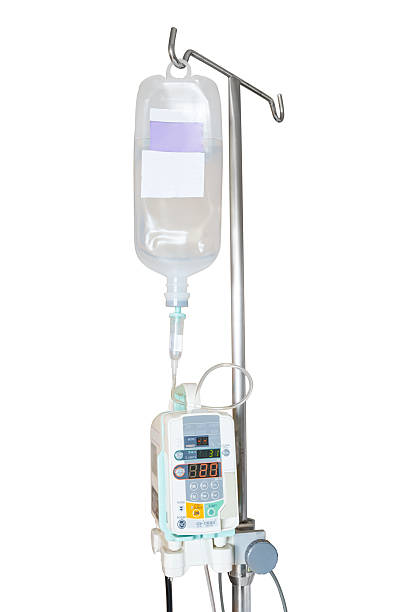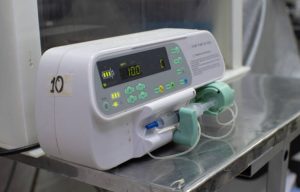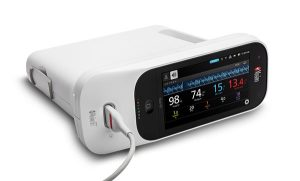
Isolated infusion pump and IV hanging on pole with clipping path
Infusion Pump Overview
An infusion pump is a medical device used to deliver fluids, medications, or nutrients directly into a patient’s bloodstream or subcutaneously in a controlled manner. They are commonly used in hospitals, clinics, and home healthcare settings.
Types of Infusion Pumps
- Volumetric Pumps:
- Deliver a set volume of fluid over a specified period.
- Commonly used for intravenous (IV) fluids.
- Syringe Pumps:
- Use a syringe to dispense medication.
- Ideal for precise dosing of small volumes.
- Ambulatory Pumps:
- Portable devices for outpatient or home use.
- Allow patients to move freely while receiving treatment.
- Patient-Controlled Analgesia (PCA) Pumps:
- Allow patients to self-administer pain medication within prescribed limits.
Key Features & Specifications
- Programmable Settings: Adjustable flow rates, volume limits, and delivery schedules.
- User Interface: Touchscreen or keypad for easy navigation and settings adjustment.
- Safety Alarms: Alerts for issues like occlusions, air in the line, or low battery.
- Infusion Accuracy: High precision in fluid delivery to prevent overdosing or underdosing.
- Data Logging: Records infusion data for monitoring and analysis.
Performance
- Efficiency: High reliability in delivering medication accurately and consistently.
- Response Time: Quick adjustments to flow rates as needed.
- Battery Life: Long-lasting batteries in portable models for uninterrupted service.
Safety Features
- Infusion Limits: Programmable safety limits to prevent overdose.
- Smart Pumps: Advanced models use algorithms to optimize medication delivery and reduce errors.
- Alarm Systems: Immediate alerts for any malfunctions or critical conditions.
Pros and Cons
Pros:
- Precision: Allows for accurate dosing of medications.
- Automation: Reduces the need for manual administration of IV fluids and medications.
- Versatility: Suitable for various treatments, including chemotherapy, pain management, and hydration.
Cons:
- Cost: High-quality infusion pumps can be expensive for healthcare facilities.
- Training Required: Staff must be trained to operate pumps and respond to alarms.
- Technical Issues: Potential for malfunction or user errors if not properly maintained.
Popular Brands & Prices
- Alaris System by BD:
- Price: Approximately $5,000 – $10,000
- Features: Modular system for various infusion types, extensive safety features.
- Hospira Plum 360:
- Price: Around $2,500 – $5,000
- Features: Easy-to-use interface, integration with electronic health records.
- B. Braun Infusomat Space:
- Price: Approximately $3,000 – $6,000
- Features: High precision, customizable settings, and safety alarms.
User Feedback/Testimonials
- Nurses: “The Alaris system has made our workflow much smoother with its easy-to-use interface and safety features.”
- Patients: “Having an infusion pump at home allowed me to manage my treatment more comfortably.”
- Healthcare Facilities: “The data logging capabilities help us track patient responses and improve care.”
Disclaimer
Infusion pumps should only be used by trained healthcare professionals. Regular maintenance, calibration, and adherence to protocols are essential to ensure safe and effective operation.
This overview provides essential information about infusion pumps, including types, features, pricing, and their importance in delivering medical treatments.








